Abarth 500 595 695 vs Hyundai Inster – Which one offers the better deal?
Both models have their strengths – but which one suits you more?
Compare performance, efficiency, price and space directly: Abarth 500 595 695 or Hyundai Inster?
Costs and Efficiency:
When it comes to price and running costs, the biggest differences usually appear. This is often where you see which car fits your budget better in the long run.
Hyundai Inster has a clearly advantage in terms of price – it starts at 20500 £, while the Abarth 500 595 695 costs 32600 £. That’s a price difference of around 12077 £.
In terms of energy consumption, the advantage goes to the Hyundai Inster: with 14.30 kWh per 100 km, it’s slightly more efficient than the Abarth 500 595 695 with 17.10 kWh. That’s a difference of about 2.80 kWh.
As for range, the Hyundai Inster performs clearly perceptible better – achieving up to 370 km, about 105 km more than the Abarth 500 595 695.
Engine and Performance:
Power, torque and acceleration say a lot about how a car feels on the road. This is where you see which model delivers more driving dynamics.
When it comes to engine power, the Abarth 500 595 695 has a distinct edge – offering 155 HP compared to 115 HP. That’s roughly 40 HP more horsepower.
In acceleration from 0 to 100 km/h, the Abarth 500 595 695 is convincingly quicker – completing the sprint in 7 s, while the Hyundai Inster takes 10.60 s. That’s about 3.60 s faster.
In terms of top speed, the Abarth 500 595 695 performs minimal better – reaching 155 km/h, while the Hyundai Inster tops out at 150 km/h. The difference is around 5 km/h.
There’s also a difference in torque: Abarth 500 595 695 pulls distinct stronger with 235 Nm compared to 147 Nm. That’s about 88 Nm difference.
Space and Everyday Use:
Whether family car or daily driver – which one offers more room, flexibility and comfort?
Both vehicles offer seating for 4 people.
In curb weight, Hyundai Inster is barely noticeable lighter – 1380 kg compared to 1410 kg. The difference is around 30 kg.
In terms of boot space, the Hyundai Inster offers clearly perceptible more room – 280 L compared to 185 L. That’s a difference of about 95 L.
In maximum load capacity, the Hyundai Inster performs convincingly better – up to 1059 L, which is about 509 L more than the Abarth 500 595 695.
When it comes to payload, Abarth 500 595 695 minimal takes the win – 385 kg compared to 357 kg. That’s a difference of about 28 kg.
Who wins the race?
The Hyundai Inster proves to be outperforms in nearly all aspects and therefore becomes our DriveDuel Champion!
Hyundai Inster is the better all-rounder in this comparison.
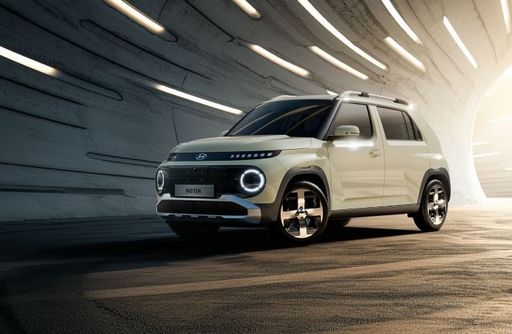 @ Hyundai Motor Company
@ Hyundai Motor Company
Hyundai Inster
Abarth 500 595 695
The Abarth 500, particularly in its 595 and 695 renditions, captures the spirit of Italian motoring with its compact yet aggressive design. Known for its lively performance and distinctive styling, this little powerhouse is a joy to drive, offering an engaging experience that appeals to enthusiasts. With its rich motorsport heritage, the Abarth 500 embodies the essence of fun and excitement on both the streets and the race track.
details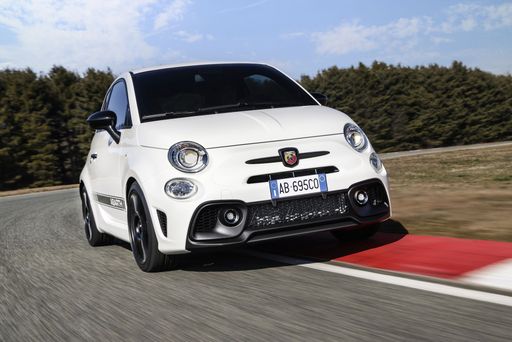 @ Abarth / Stellantis Media
@ Abarth / Stellantis Media
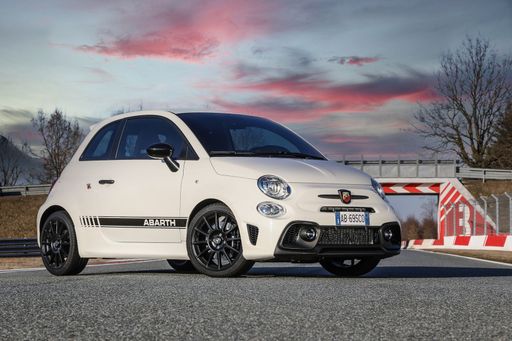 @ Abarth / Stellantis Media
@ Abarth / Stellantis Media
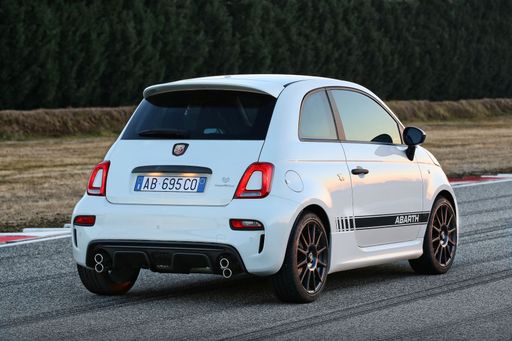 @ Abarth / Stellantis Media
@ Abarth / Stellantis Media
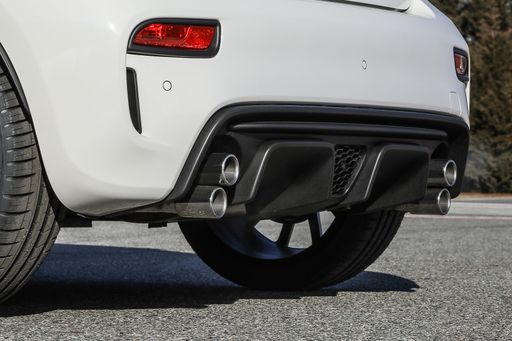 @ Abarth / Stellantis Media
@ Abarth / Stellantis Media
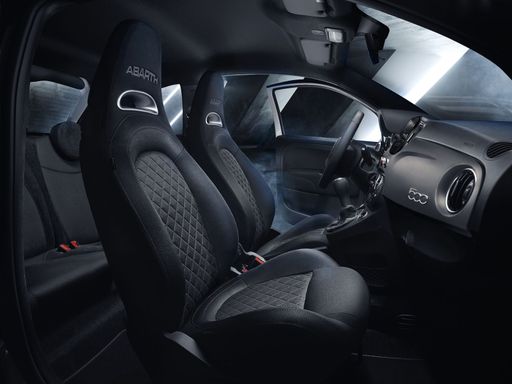 @ Abarth / Stellantis Media
@ Abarth / Stellantis Media
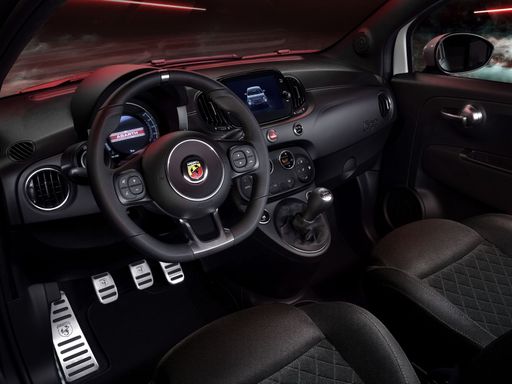 @ Abarth / Stellantis Media
@ Abarth / Stellantis Media
Hyundai Inster
The Inster has quickly captured the attention of automotive enthusiasts with its striking design and dynamic performance. This model seamlessly blends advanced technology with comfort, making it an ideal choice for both daily commutes and adventurous road trips. With its spacious interior and innovative features, the Inster promises an exhilarating driving experience that doesn’t compromise on practicality.
details @ Hyundai Motor Company
@ Hyundai Motor Company
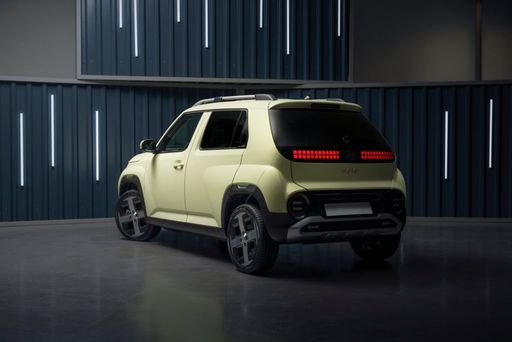 @ Hyundai Motor Company
@ Hyundai Motor Company
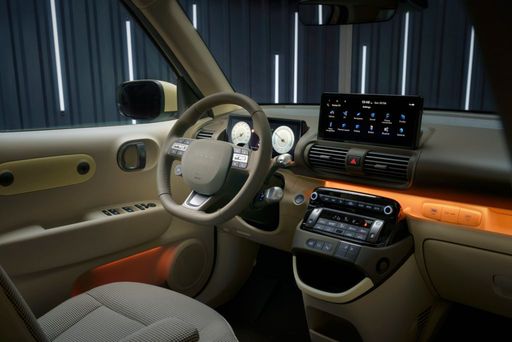 @ Hyundai Motor Company
@ Hyundai Motor Company
 @ Abarth / Stellantis Media
@ Abarth / Stellantis Media
|
 @ Hyundai Motor Company
@ Hyundai Motor Company
|
|
|
|
Costs and Consumption |
|
|---|---|
|
Price
32600 - 39400 £
|
Price
20500 - 25800 £
|
|
Consumption L/100km
-
|
Consumption L/100km
-
|
|
Consumption kWh/100km
17.1 - 18.8 kWh
|
Consumption kWh/100km
14.3 - 15.1 kWh
|
|
Electric Range
242 - 265 km
|
Electric Range
327 - 370 km
|
|
Battery Capacity
37.80 kWh
|
Battery Capacity
42 - 49 kWh
|
|
co2
0 g/km
|
co2
0 g/km
|
|
Fuel tank capacity
-
|
Fuel tank capacity
-
|
Dimensions and Body |
|
|---|---|
|
Body Type
Hatchback
|
Body Type
SUV
|
|
Seats
4
|
Seats
4
|
|
Doors
3
|
Doors
5
|
|
Curb weight
1410 - 1435 kg
|
Curb weight
1380 - 1433 kg
|
|
Trunk capacity
185 L
|
Trunk capacity
238 - 280 L
|
|
Length
3673 mm
|
Length
3825 - 3845 mm
|
|
Width
1682 mm
|
Width
1610 mm
|
|
Height
1518 mm
|
Height
1575 - 1610 mm
|
|
Max trunk capacity
550 L
|
Max trunk capacity
1059 L
|
|
Payload
370 - 385 kg
|
Payload
317 - 357 kg
|
Engine and Performance |
|
|---|---|
|
Engine Type
Electric
|
Engine Type
Electric
|
|
Transmission
Automatic
|
Transmission
Automatic
|
|
Transmission Detail
-
|
Transmission Detail
Reduction Gearbox
|
|
Drive Type
Front-Wheel Drive
|
Drive Type
Front-Wheel Drive
|
|
Power HP
155 HP
|
Power HP
97 - 115 HP
|
|
Acceleration 0-100km/h
7 s
|
Acceleration 0-100km/h
10.6 - 11.7 s
|
|
Max Speed
155 km/h
|
Max Speed
140 - 150 km/h
|
|
Torque
235 Nm
|
Torque
147 Nm
|
|
Number of Cylinders
-
|
Number of Cylinders
-
|
|
Power kW
114 kW
|
Power kW
71 - 85 kW
|
|
Engine capacity
-
|
Engine capacity
-
|
General |
|
|---|---|
|
Model Year
2023
|
Model Year
2025
|
|
CO2 Efficiency Class
A
|
CO2 Efficiency Class
A
|
|
Brand
Abarth
|
Brand
Hyundai
|
Is the Abarth 500 595 695 offered with different drivetrains?
The Abarth 500 595 695 is offered with Front-Wheel Drive.
The prices and data displayed are estimates based on German list prices and may vary by country. This information is not legally binding.
